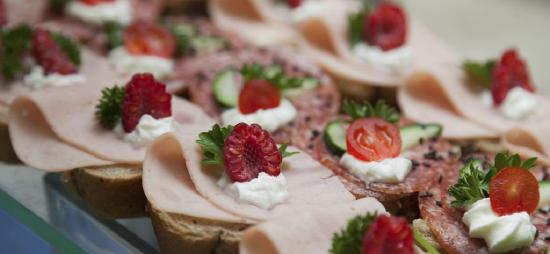5.9: Muy versus más versus mucho
- Page ID
- 44564
Muy = Very
- Muy is used with adjectives and adverbs.
- Arturo es muy alto.
- Yo estoy muy feliz.
- La pizza llegó muy rápido.
- El jurado llegó a un veredicto muy lentamente.
Mucho = A lot / Much/ Many
- Mucho is used with verbs. It goes after the verb.
- Mi padre lee mucho.
- Yo trabajo mucho.
- Mucho/ mucha/ muchos/ muchas are used with nouns. They go in front of the noun and must match the noun in Gender and Number.
- Mark Zuckerberg tiene mucho dinero.
- Hay mucha gente en la fiesta.
- Mi hermana tiene muchos amigos. Ella es muy sociable.
- Alejandro es un mujeriego. Tiene muchas novias.
Más = More
- Más is used with verbs, nouns, and adjectives.
- It goes after verbs and before nouns and adjectives.
- Verb: Saqué una C en mi examen de álgebra. Necesito estudiar más.
- Noun: El médico dice que yo necesito comer más vegetales.
- Adjective: Yo soy más reservada que mi mejor amiga. Ella es más sociable que yo.

Mi abuela es muy vieja y muy cariñosa. No tiene mucho dinero, pero sí tiene mucha familia y muchos amigos que la quieren mucho. Ella siempre dice que no hay nada más importante en la vida que la familia. La quiero y la respeto muchísimo.
Actividad 29
Muy. To get comfortable with muy give the English equivalents of the sentences below. In the box at the bottom, make a note about what you have noticed about where muy goes in the sentence.
1. Mi esposa es muy bonita.________
2. El centro estudiantil está muy cerca.________
3. Mi amigo Alberto es muy inteligente. ________
4. Sandra es una chica muy graciosa (funny).________
5. Alejandro y Felipe son muy traviesos (mischievous).________
6. La costa está muy lejos de Kansas. ________

Actividad 30
Más. To get comfortable with más give the English equivalents of the sentences below. In the box at the bottom, make notes about what you have noticed about where más goes in the sentence. ¡Ojo! Watch out! There are a few different places it can go.
1. Yo quiero cocinar más. ________
2. Me gustaría más café, por favor. ________
3. Necesitamos más comida para la fiesta.________
4. Necesito trabajar más porque quiero más dinero. ________
________
Actividad 31
Mucho. To get comfortable with mucho, give the English equivalents of the sentences below. In the box at the bottom, make a note about what you have noticed about where mucho goes in the sentence and what other grammar concerns need to be taken into account.
1. Mi hermana baila mucho. ________
2. Este proyecto es mucho trabajo.________
3. La profesora tiene muchas clases. ________
4. Corro mucho porque me gustan los maratones. ________
5. Sofía tiene muchos amigos en Instagram. ________
6. Hay mucha comida en la fiesta. ________

Actividad 32
Rellenar el espacio. Fill in the blank using muy, más, or mucho to complete the sentences below. Some of these have more than one correct option—when you encounter one of them, discuss with a partner how the meaning of the sentence changes based on which word you use.
1. Yo estoy ________ cansado.
2. Jorge trabaja ________.
3. Mi esposa es ________ graciosa.
4. Necesitamos ________/________ pizza para la fiesta.
5. Yo quiero ser ________/________ fuerte, así que necesito hacer ________/________ ejercicio.
6. Mi novia necesita estudiar ________/________. ¡Va a sacar F en su clase de literatura!
7. Mi amiga quiere correr un maratón. Para estar lista, se necesita entrenar ________/________.
8. Hay ________ cerveza, ________ vino y ________ refrescos en la fiesta.
9. ¿Te gusta este grupo de rock? Sí, me gusta __________________.
Actividad 33
Preguntas personales. Answer the following questions that use muy, más, or mucho using complete sentences. Then, interview a classmate in Spanish. Audio
1. ¿Lees mucho? ¿Por qué sí o por qué no? ________
2. ¿Cocinas mucho? ¿Por qué sí o por qué no? ________
3. ¿Crees que cuesta más comer en un restaurante o preparar comida en casa? ________
________
4. ¿Eres muy extrovertid@, o eres más introvertid@?________
5. ¿Necesitas estudiar más para tus clases? ¿Por qué sí o por qué no? ________
________
6. ¿Qué te gusta más: leer en la playa o nadar? ________
7. ¿Conoces a una persona muy graciosa? ¿Cómo se llama? ________
________
Actividad 34
Muy mucho. May native speakers of English make the mistake of trying to translate “very much” as “muy mucho.” This is not correct in Spanish. Instead, we use the superlative muchísmo/a/os/as, meaning very much or a LOT. Read the paragraph below, then write a sentence of your own using muchísmo. Share with a partner and be prepared to share with the class.

Este es mi perro, Fidel. Tiene dos años y tiene muchísima energía. Es grande y come muchísima comida. ¡Pesa (he weighs) 32 kilos! A él le gusta jugar, y yo le compro muchísimos juguetes. Yo le saco a caminar muchísimo. También, vamos al parque de perros con muchísima frecuencia. ¡Quiero a mi Fidel muchísimo!


